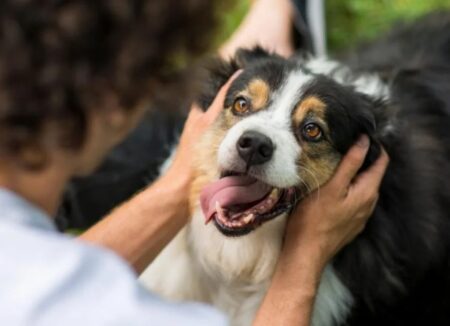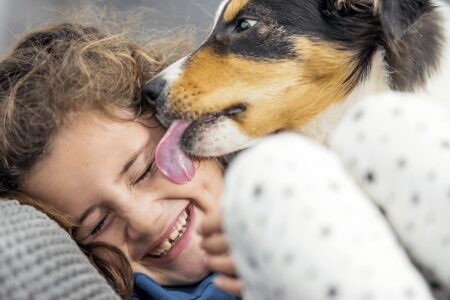
Reasons Why Dogs Are Cleaner than Human
Despite the common belief that dogs are dirty, they are cleaner than humans in many ways. For instance, dogs have several natural adaptations and behaviors that keep them cleaner and healthier than us, from their grooming habits to their immune systems, there are numerous reasons why dogs can be considered cleaner than humans. Whether you’re a dog owner or just curious about our four-legged friends, understanding these reasons can give you a new appreciation for dogs and their amazing bodies.
SEE ALSO: Real Reasons Why Dogs Are Hunters
Reasons Why Dogs Are Cleaner than Human
Dogs are cleaner than humans because of the following reasons:
- Dogs Regularly Groom Themselves by Licking Their Fur
- Dogs Have High Concentration of Bacteria-killing Enzymes in Their Skin
- Dogs Have Sweat Glands in Their Paws That Help Keep It Clean
- Dogs Have Fewer Apocrine Glands Than Humans
- Dogs Have a More Efficient Respiratory System
- Dogs Have a Strong Immune System
- Dogs Are Less Exposed to Toxic Chemicals and Pollutants
1. Dogs Regularly Groom Themselves by Licking Their Fur
Dogs regularly groom themselves by licking their fur, which is an effective cleaning method. When a dog licks its fur, it spreads saliva, which contains natural antibacterial agents that kill germs and remove dirt and debris, this self-grooming behavior not only keeps a dog’s coat clean and healthy but also helps them stay cool in hot weather by spreading saliva over their fur.
In contrast, humans rely on external means of cleaning, such as bathing and using soap, which can strip away natural oils and upset the balance of healthy bacteria on the skin.
In addition to saliva’s natural antibacterial properties, it also helps to keep a dog’s fur well-conditioned and healthy. The natural oils in a dog’s saliva act as a moisturizer for their fur, helping to prevent dryness and keep the coat shiny and healthy.
Furthermore, the act of licking and grooming helps stimulate blood flow to the skin and improve circulation, which can enhance overall health and well-being. This behavior is deeply ingrained in dogs from their wolf ancestors and is a crucial part of their hygiene and health maintenance.
2. Dogs Have High Concentration of Bacteria-killing Enzymes in Their Skin
Dogs have a high concentration of bacteria-killing enzymes in their skin, which makes them cleaner than humans. Dogs produce large quantities of a substance called lysozyme, which is a potent antimicrobial enzyme. Lysozyme breaks down bacterial cell walls, effectively killing bacteria and preventing them from colonizing the skin.
This antibacterial property is especially effective in areas of the skin that are prone to infection, like the paws and muzzle.
Lysozyme is not only found in the skin but also in other areas of a dog’s body, such as saliva and tears. This broad distribution of lysozyme across the body provides a comprehensive defense against bacteria, contributing to a dog’s overall cleanliness and resistance to disease.
In comparison, human skin has a much lower concentration of lysozyme, which makes us more susceptible to bacterial colonization and infection. So, the high concentration of lysozyme in a dog’s skin makes them cleaner and less prone to bacterial infections than humans.
3. Dogs Have Sweat Glands in Their Paws That Help Keep It Clean
Dogs have sweat glands in their paws that help keep them clean in two ways. First, the sweat from these glands helps to cool the paw pads, which prevents the buildup of bacteria and other microorganisms. When paws become overheated, bacteria can multiply rapidly, leading to infections and inflammation.
Second, the sweat from these glands contains antibacterial and antimicrobial compounds that help to inhibit the growth of harmful bacteria and these compounds are released onto the paw pads as the dog walks, providing a natural defense against bacteria and helping to keep the paws clean and healthy.
The sweat glands in a dog’s paws are a fascinating adaptation that helps them stay healthy and clean in ways that are not possible for humans. Unlike humans, dogs do not have sweat glands all over their body and instead rely on panting and these specialized paw glands to regulate body temperature.
Moreover, the sweat glands in a dog’s paws also act as a natural deodorizer. As the sweat evaporates, it takes with it any odors or bacteria that might be on the paws, helping to keep them smelling fresh and clean.
4. Dogs Have Fewer Apocrine Glands Than Humans
Apocrine glands are specialized sweat glands that produce a thick, oily substance that can harbor bacteria. Humans have apocrine glands all over their body, particularly in the armpits, scalp, and groin, which can lead to body odor.
Dogs, on the other hand, have far fewer apocrine glands, and they are mainly found on their paws and anal region. This means that they produce less of the oily substance, reducing the amount of bacteria that can colonize their skin.
The reduced number of apocrine glands in dogs not only keeps them cleaner and less smelly but also helps them stay cool. Dogs primarily cool themselves by panting, and they have a much more efficient cooling system than humans. Apocrine sweat can make a human hotter, as the thick, oily substance blocks sweat pores and prevents the body from releasing heat efficiently.
Additionally, the lack of apocrine glands on the scalp helps to keep a dog’s fur clean and free from excess oils, which can attract dirt and debris. Overall, this difference in apocrine glands is one of the reasons why dogs are cleaner than humans.
5. Dogs Have a More Efficient Respiratory System
Dogs have a more efficient respiratory system than humans, which helps to keep them cleaner in several ways. First, they have a higher breathing rate than humans, which helps to filter out dust, pollen, and other airborne particles from their lungs. This means that fewer of these particles can build up in the respiratory tract and cause irritation or infection.
Second, dogs have a more developed olfactory system than humans, which allows them to detect odors at much lower concentrations. This heightened sense of smell allows dogs to avoid areas with unpleasant odors, which can be indicative of bacteria or other harmful substances.
Third, dogs’ nostrils are angled differently than humans’, allowing them to breathe in a greater volume of fresh air. This increased air intake helps to flush out any impurities or irritants that may have been inhaled.
Finally, dogs’ respiratory systems are designed to handle a wider range of environmental conditions than humans. They are better adapted to high altitudes, extreme temperatures, and dusty or smoky environments, which can help protect them from respiratory illnesses and infection.
6. Dogs Have a Strong Immune System
Dogs have a strong immune system that helps to keep them cleaner and healthier than humans. Here are a few ways in which dogs’ immune systems help to maintain their cleanliness:
- Larger lymphoid tissues: Dogs have larger lymphoid tissues, which are responsible for producing white blood cells that fight infection. This larger size allows dogs to produce more white blood cells and mount a stronger immune response to foreign invaders.
- More potent white blood cells: Dogs have white blood cells that are more potent and effective at eliminating harmful bacteria and viruses than human white blood cells.
- Increased resistance to bacteria: Dogs have more natural resistance to bacterial infections, including infections that can cause skin conditions like acne and boils. Their immune system produces more antibodies and has a stronger inflammatory response, which helps to keep their skin clean and healthy.
- Immune system development: Dogs develop a robust immune system at an early age, which helps to protect them against harmful bacteria and viruses. This early development is important because dogs are exposed to a wider range of environmental pathogens than humans.
7. Dogs Are Less Exposed to Toxic Chemicals and Pollutants
Dogs are generally less exposed to toxic chemicals and pollutants than humans thereby making them cleaner and less at risk for certain health issues. Here’s how:
- Indoor exposure: Humans spend a lot of time indoors, where they’re exposed to chemicals from household cleaners, paints, furniture, and building materials but dogs, on the other hand, spend much of their time outdoors, reducing their exposure to these chemicals.
- Outdoor exposure: Dogs may be exposed to pollutants outdoors but at a lower level than humans.
- Diet: Humans eat a wide range of processed foods that can contain artificial additives, preservatives, and pesticides. Dogs, on the other hand, generally eat pet food that is specially formulated to meet their nutritional needs and is less likely to contain toxins.
- Skin exposure: Humans have a larger surface area of skin that is exposed to the environment, which increases their risk of absorbing chemicals and pollutants through the skin. Dogs’ fur provides a protective barrier, reducing their risk of exposure.
What Animal Has The Cleanest Mouth?
- Crocodiles: Despite their reputation as fierce hunters, crocodiles have remarkably clean mouths. Their saliva contains a strong antibacterial agent that helps to keep their mouths free of infection.
- Dogs: As we discussed earlier, dogs have a strong immune system that helps to keep their mouths clean. They also have saliva that contains antibacterial enzymes, which can help to prevent the growth of harmful bacteria in their mouths.
- Cats: As we discussed earlier, cats have specialized grooming habits that help to keep their mouths clean.
- Horses: Horses have strong teeth that are constantly growing and being worn down by grazing, which helps to keep their mouths clean. They also have a highly developed sense of smell that allows them to avoid eating contaminated food.
- Pigs: Pigs have a highly acidic saliva that kills bacteria and prevents the growth of pathogens in their mouths. They also have a wide range of taste receptors that allow them to detect potentially harmful substances in their food.
- Sharks: Sharks are often thought of as fearsome predators, but their mouths are surprisingly clean. Sharks constantly produce new teeth throughout their lives, which helps to keep their mouths free of harmful bacteria.
- Elephants: Elephants have powerful immune systems that help to keep their mouths clean and free of bacteria. Their saliva contains compounds that inhibit bacterial growth and promote healing.
- Birds: Birds have a unique system of cleaning their mouths and beaks by wiping them on branches or rubbing them against their feathers. This helps to remove bacteria and keep their mouths clean.
- Rabbits: Rabbits have bacteria-resistant saliva that helps to keep their mouths clean and free of infection.
SEE ALSO: Real Reasons Why Dogs Love Bone
FAQs
Q. What is the cleanest part of a dog’s body?
The cleanest part of a dog’s body is usually its mouth, which is kept clean by their constant licking and self-grooming habits.
Q. Are dogs generally clean?
Yes, dogs are generally clean animals thanks to their strong immune system, self-grooming habits, and lack of exposure to many toxins.
Q. How hygienic are dogs?
Dogs are quite hygienic thanks to their strong immune systems, grooming habits, and efficient respiratory system, which help to keep them clean and healthy.
Q. Do dogs have the cleanest mouth in the world?
No, dogs don’t have the cleanest mouth in the world, but their saliva does contain antibacterial enzymes that make their mouths cleaner than most animals


